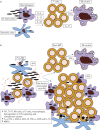Immune reconstitution inflammatory syndrome associated with pulmonary pathogens
- PMID: 28049128
- PMCID: PMC5642276
- DOI: 10.1183/16000617.0042-2016
Immune reconstitution inflammatory syndrome associated with pulmonary pathogens
Abstract
Immune reconstitution inflammatory syndrome (IRIS) is an exaggerated immune response to a variety of pathogens in response to antiretroviral therapy-mediated recovery of the immune system in HIV-infected patients. Although IRIS can occur in many organs, pulmonary IRIS, associated with opportunistic infections such as Mycobacterium tuberculosis and Pneumocystis jirovecii, is particularly associated with high morbidity and mortality. The pathology of IRIS is associated with a variety of innate and adaptive immune factors, including CD4+ T-cells, CD8+ T-cells, γδ T-cells, natural killer cells, macrophages, the complement system and surfactant proteins, Toll-like receptors and pro-inflammatory cytokines and chemokines. Although there are numerous reports about the immune factors involved in IRIS, the mechanisms involved in the development of pulmonary IRIS are poorly understood. Here, we propose that studies using gene-deficient murine and nonhuman primate models will help to identify the specific molecular targets associated with the development of IRIS. An improved understanding of the mechanisms involved in the pathology of pulmonary IRIS will help to identify potential biomarkers and therapeutic targets in this syndrome.
Copyright ©ERS 2017.
Conflict of interest statement
Conflict of interest: Disclosures can be found alongside this article at
Figures

References
-
- Meintjes G, Scriven J, Marais S. Management of the immune reconstitution inflammatory syndrome. Curr HIV/AIDS Rep 2012; 9: 238–250. - PubMed
-
- Longley N, Harrison TS, Jarvis JN. Cryptococcal immune reconstitution inflammatory syndrome. Curr Opin Infect Dis 2013; 26: 26–34. - PubMed
-
- Leone S, Nicastri E, Giglio S, et al. Immune reconstitution inflammatory syndrome associated with Mycobacterium tuberculosis infection: a systematic review. Int J Infect Dis 2010; 14: e283–e291. - PubMed
-
- Ratnam I, Chiu C, Kandala NB, et al. Incidence and risk factors for immune reconstitution inflammatory syndrome in an ethnically diverse HIV type 1-infected cohort. Clin Infect Dis 2006; 42: 418–427. - PubMed
Publication types
MeSH terms
Substances
Grants and funding
LinkOut - more resources
Full Text Sources
Other Literature Sources
Research Materials
